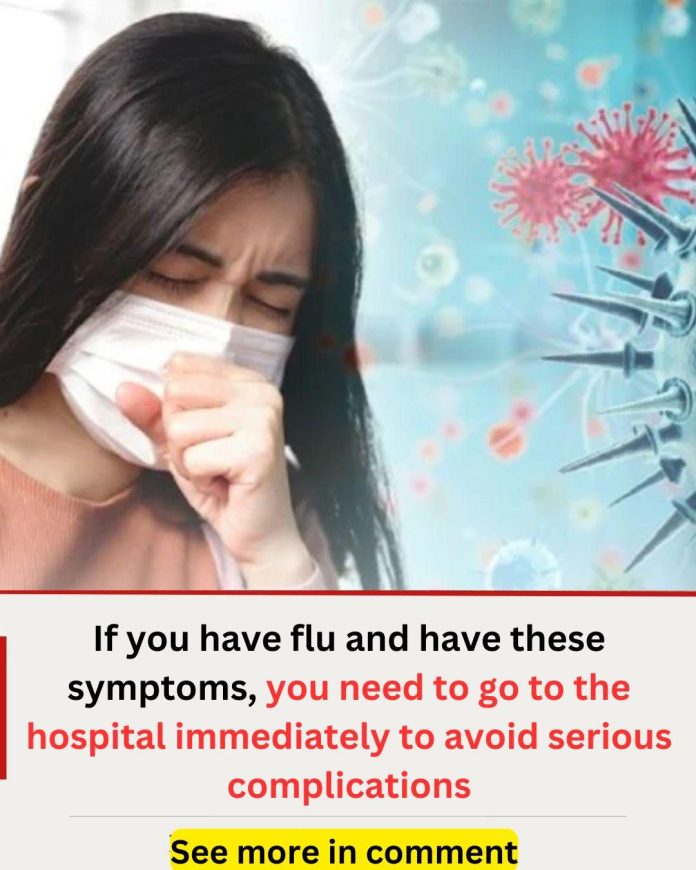Influenza, commonly known as the flu, is a viral infection that affects the respiratory system, leading to symptoms such as fever, cough, sore throat, body aches, and fatigue. While many individuals recover from the flu without complications, certain symptoms may indicate a more severe infection requiring immediate medical attention. Recognizing these warning signs is crucial to prevent serious health issues.

Emergency Warning Signs in Adults
Adults experiencing the following symptoms should seek emergency medical care promptly:
- Difficulty Breathing or Shortness of Breath: Labored breathing or a sense of breathlessness may suggest complications like pneumonia.
- Chest Pain or Pressure: Persistent pain or pressure in the chest could be indicative of a severe respiratory infection or cardiac issues.
- Sudden Dizziness or Confusion: These symptoms may signal a significant drop in blood pressure or inadequate oxygenation, necessitating urgent evaluation.
- Severe or Persistent Vomiting: Ongoing vomiting can lead to dehydration and electrolyte imbalances, which are particularly dangerous if untreated.
- Flu-like Symptoms That Improve but Then Return with Fever and Worsened Cough: A relapse of symptoms may indicate a secondary bacterial infection requiring medical intervention.
Emergency Warning Signs in Children
Children may exhibit different signs that warrant immediate medical attention:
- Fast Breathing or Trouble Breathing: Rapid or labored breathing can be a sign of respiratory distress.
- Bluish Skin Color: A bluish tint to the skin, lips, or nail beds suggests insufficient oxygen levels.
- Not Drinking Enough Fluids: Refusal to drink or reduced fluid intake can quickly lead to dehydration in children.
Not Waking Up or Not Interacting: Unusual lethargy, difficulty waking, or lack of responsiveness are serious concerns. - Being So Irritable That the Child Does Not Want to Be Held: Excessive irritability or inconsolable crying may indicate severe discomfort or neurological involvement.
- Flu-like Symptoms That Improve but Then Return with Fever and Worsened Cough: A resurgence of symptoms could signify complications such as pneumonia.
High-Risk Groups
Certain populations are at an increased risk for flu-related complications and should be vigilant:
- Young Children: Especially those under five years old, as their immune systems are still developing.
- Elderly Individuals: Adults aged 65 and older often have weakened immune defenses.
- Pregnant Women: Pregnancy induces changes in the immune system, heart, and lungs, increasing susceptibility.
- Individuals with Chronic Health Conditions: Those with asthma, diabetes, heart disease, or weakened immune systems are more vulnerable to severe flu outcomes.

Preventive Measures
To reduce the risk of severe flu and its complications:
- Annual Vaccination: The flu vaccine is the most effective way to prevent infection and is recommended for everyone aged six months and older.
- Good Hygiene Practices: Regular handwashing, using hand sanitizers, and avoiding close contact with sick individuals can curb the spread of the virus.
- Prompt Medical Consultation: Early medical advice and treatment are crucial, especially for high-risk individuals or those exhibiting severe symptoms.
Recognizing the signs that necessitate immediate medical attention can significantly impact outcomes for individuals with the flu. If you or a loved one experience any of the aforementioned symptoms, seek medical care promptly to ensure appropriate treatment and prevent serious complications.

















